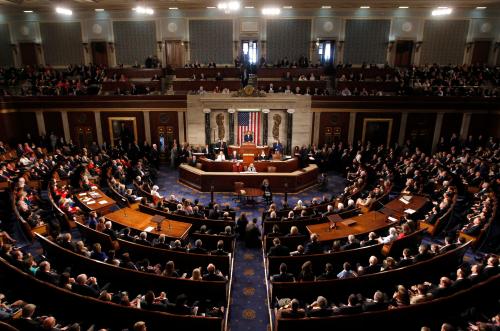This article originally appeared in The Hill on September 13, 2017
Searching for revenue raisers to offset tax cuts, House Ways and Means Committee Chairman Kevin Brady (R-Texas) has recently suggested a limit on tax deductions by businesses of the interest they pay on bonds and loans. Such a limit, if set at 50 percent of a firm’s net interest, is a sound proposal from both policy and budget perspectives.
As a policy matter, such a limit on interest deductions would mitigate the severe bias of the tax code in favor of debt and against equity. Currently, a company may deduct 100 percent of the interest it pays on debt, but none of the dividends it pays on its stock. Consequently, when a company finance projects externally, it typically issues bonds or borrows from banks. In fact, projects financed by debt have a 44 percent lower effective tax rate than those financed by equity, according to the Congressional Budget Office.
The debt bias of the tax code has serious adverse effects. First, it encourages firms to take on too much debt, which increases the chances of company bankruptcies and the instability of the financial system. For example, private equity firms have loaded up some of their acquired companies with so much debt that they later went belly up.
Second, the debt bias works against new and small companies, based primarily on intangible ideas and services, which are critical to economic growth. These growth companies own few hard assets, like factories, that lenders like to have backing their loans.
Third, the debt bias helps multinational companies lower their U.S. taxes by arranging intra-company loans to their U.S. subsidiaries from their foreign subsidiaries located in low tax jurisdictions. Their U.S. subsidiaries reduce their U.S. profits by deducting the interest paid on these intra-company loans, while the interest received on these loans is subject to minimal taxes in these foreign jurisdictions.
On the other hand, defenders of the interest deduction argue that multinational companies, in response to the proposed limits, would issue debt through foreign subsidiaries that can take the full deduction for interest. If this happens, however, the result would be more U.S. taxes paid by their U.S. subsidiaries, which would have lower deductions and higher profits.
Another argument is that limiting interest deductions is unfair to banks and other lenders, who solicit money from depositors or investors in order to make loans to borrowers. However, by applying the proposed limit to net interest, these financial firms may offset the interest they receive from borrowers with the interest they pay to depositors and investors.
Finally, Congress may be inclined to give small business exemptions from any interest deduction limit. A plausible response might be to allow a firm to deduct 100 percent of its net interest payments if they total less than $100,000 per year.
From the budget perspective, a 50 percent limit on interest deductions for businesses would also make sense. In 2015, nonfinancial corporations paid $453 billion in interest. With the above exemption for small business and transition rules for existing debt, the net interest deduction for these corporations might be $400 billion per year.
If Congress limited this deduction to 50 percent or $200 billion, and the corporate tax rate were reduced to 25 percent, the limit would increase tax revenue by $50 billion each year above the new baseline. This amounts to $500 billion over 10 years, the congressional period for measuring budget impacts of tax legislation.
This $500 billion would be a significant offset against the revenue loss from reducing the U.S. corporate tax rate. Lowering that rate from 35 percent to 25 percent would lead to a revenue loss of $1.2 trillion over 10 years. Lowering that rate to 15 percent and applying that rate to business income from partnerships and other tax pass-throughs, as President Trump has proposed, would result in a revenue loss of more than $5 trillion over 10 years.
Offsetting the revenue loss from lower rates is crucial under congressional budget rules. Trump’s rate cuts, like those of George W. Bush, would automatically expire after 10 years unless they are revenue neutral, as the revenue lost from lower tax rates is fully offset by revenue gained from repealing or restricting current tax preferences. And politically, Republican fiscal hawks would probably vote against tax reform if it increased the budget deficit by over $1 trillion.
While many politicians want to lower the corporate tax rate, few have proposed revenue offsets. Instead, they talk vaguely about closing “tax loopholes.” Yes, politicians from both parties have proposed to tax incentive fees of hedge fund managers at the higher rate for ordinary income than capital gains. Yet this proposal would raise less than $20 billion over the next 10 years.
The biggest tax preferences for businesses, such as the tax credit for research, the lower rate for manufacturing and the tax exemption for receiving interest on municipal bonds, are likely untouchable for political and policy reasons. Moving from accelerated to straight-line depreciation would slow the timing of corporate tax revenues, but would not materially change the amount.
In short, limiting net interest deductions by firms is the one business preference with both favorable policy effects and a big revenue impact. This limit should be an important part of any plan for business tax reform.
Robert Pozen has been a nonresident senior fellow at Brookings since 2010. In 2015, he generously committed to endow the Director’s Chair for the Urban-Brookings Tax Policy Center. Until 2010, Pozen was executive chairman of MFS Investment Management and, before 2002, served in various positions at Fidelity Investments. He did not receive financial support from any firm or person for this article or from any firm or person with a financial or political interest in this article. He is currently not an officer, director, or board member of any organization with an interest in this article.
The Brookings Institution is committed to quality, independence, and impact.
We are supported by a diverse array of funders. In line with our values and policies, each Brookings publication represents the sole views of its author(s).










Commentary
Op-edHouse GOP plan will boost tax revenue and satisfy businesses
September 13, 2017